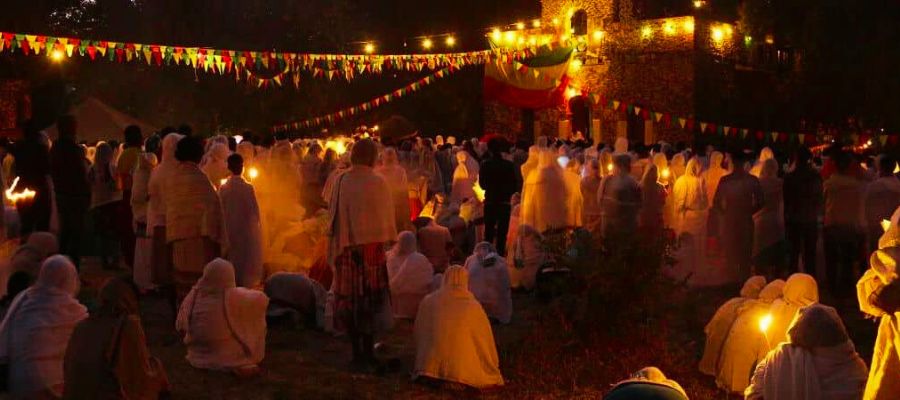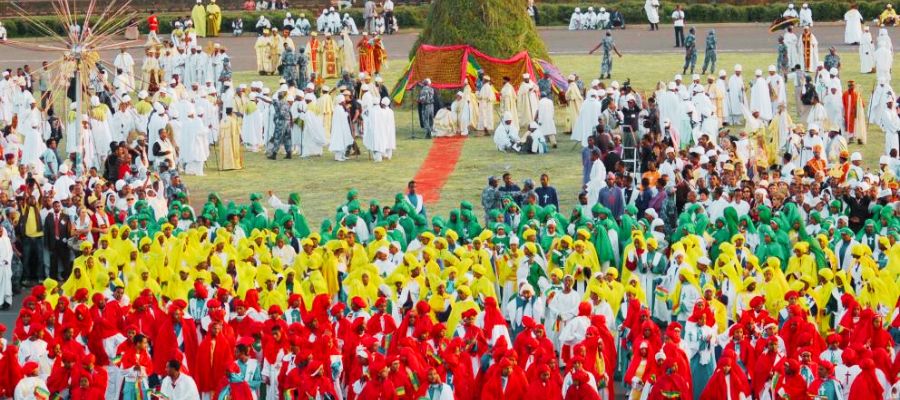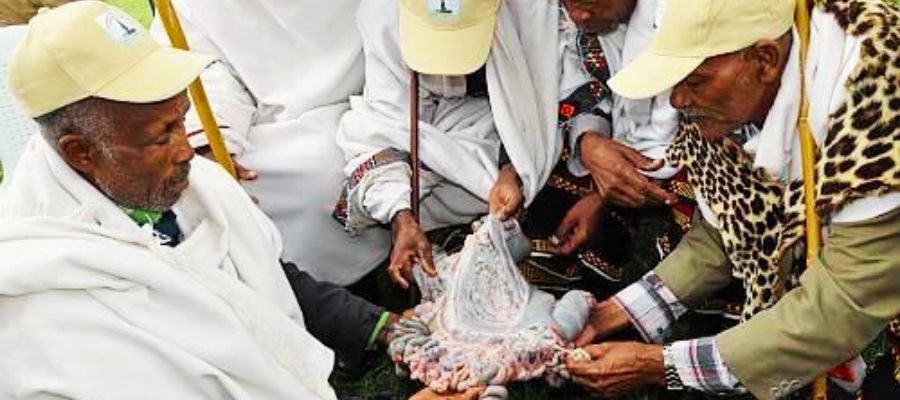Ethiopian festivals are vibrant and elaborate celebrations that often span several days, featuring colorful displays of traditional dress, music, dance, and religious ceremonies. Many of the most important festivals are rooted in Christianity, including Meskel, Christmas, Timkat, Kiddus Yohannes, and Easter.

These festivals attract large crowds of locals and tourists alike, who come to witness the spectacle and participate in the festivities. Other widely celebrated festivals include Irreechaa, a traditional Oromo harvest festival, and Ashenda, a celebration of the end of the rainy season in Tigray and Amhara regions.
Overall, Ethiopian festivals offer a glimpse into the country's rich cultural heritage and are an unforgettable experience for all who attend.
Ethiopian New Year
Ethiopian New Year is a significant cultural event that takes place around September 11th or 12th. It is known as Enkutatash, which translates to “Gift of Jewels”.
The holiday is a celebration of the end of the rainy season, and the lush green landscape is dotted with yellow Meskel flowers, making it a picturesque time to celebrate the new harvest.
Ethiopians follow the Julian calendar, which consists of 13 months, with 12 months of 30 days and one month with just 5 days (6 in a leap year). The calendar is 7 years and 8 months behind the Western Gregorian calendar.
New Year's Eve and Day Traditions
On New Year's Eve, Ethiopians traditionally burn torches of dry wood in front of their houses, signifying the end of the previous year and the beginning of the new one.
On New Year's Day, girls dressed in new clothes go door to door singing songs and receiving small gifts.
It is also a day for feasting with family and friends, and many people prepare traditional dishes such as injera (a sourdough flatbread) and doro wat (a spicy chicken stew).
Importance of New Year Celebration
Ethiopian New Year is an important celebration in the country's culture, and it is a time to reflect on the past year and set intentions for the new one.
The holiday is also an opportunity to spend time with loved ones and strengthen community bonds. The celebration of Enkutatash is a testament to the resilience and joy of the Ethiopian people, who have maintained their unique cultural traditions despite many challenges throughout their history.
Meskel Festival
Meskel is a religious holiday celebrated in Ethiopia to commemorate the discovery of the True Cross upon which Jesus was crucified.

The holiday is held annually for two days, beginning on September 26th (or September 27th during a leap year). Meskel is an important celebration in Ethiopia, and it attracts hundreds of thousands of tourists to the country, making it a significant boost to the country's tourism industry.
Legend of the True Cross
According to legend, in the 4th century AD, the Roman Empress Helena, mother of Constantine the Great, received a vision in a dream that showed her where to find the cross upon which Jesus was crucified.
She ordered the people of Jerusalem to collect wood, and the smoke from a huge bonfire indicated the location where the cross was buried.
Demera and Meskel Celebrations
The Meskel celebration consists of two days: the first day is Demera, which is celebrated on September 26th. On this day, bonfires are built topped by a cross, and flowers are tied to the cross.
The next day is Meskel, where people go to the spot of the Demera and use the ashes to mark their foreheads with the sign of the cross. The celebration involves feasting, drinking, and dancing, and it is a time for family and community to come together.
Meskel Flowers and UNESCO Recognition
One of the significant occurrences of the festival is the coinciding with the mass blooming of Meskel flowers, the golden yellow daisies.
In 2013, UNESCO recognized Meskel as an important cultural heritage of humanity by inscribing it on the Representative List of the Intangible Cultural Heritage.
This recognition further highlighted the cultural significance of the celebration and its importance in Ethiopian history and tradition.
Timket (Epiphany)
Timket, also known as Ethiopian Epiphany, is a major religious holiday celebrated on January 19th and 20th. During the event, replicas of the Ark of the Covenant, known as Tabots, are carried by priests under colorful umbrellas in a procession.
.jpg)
The celebration involves singing, dancing, and ululating as the Tabots are carried to their Overnight resting place. The next morning, church officials sprinkle holy water over the faithful and renew their vows. The congregation then follows as the Tabots are carried back to their respective churches.
The event is rich in religious symbolism and is an important occasion for Ethiopian Orthodox Christians. It is also a significant cultural event that attracts visitors from around the world.
The celebration of Timket has been inscribed on the Representative List of the Intangible Cultural Heritage of Humanity by UNESCO.
Irrecha Festival
The Oromo people's traditional religion of Waaqeffannaa has a unique thanksgiving celebration called "Irreechaa" or "Irreessaa". This festival has been observed for more than 6000 years and is a colorful celebration of thankfulness, blessings, and prayers to God (Waaqa) for their achievements.
People from all walks of life gather to request peace and harmony between nature and man and for the health of their families, relatives, animals, and the country as a whole. Irreechaa is marked by two seasonal shifts.
Irreechaa Tulluu is celebrated in May at the top of mountains to mark the end of the dry season and the onset of the rainy season. Irreechaa Malkaa takes place in late September or early October to welcome the onset of the dry season and to pray for a good harvest after the rains.
The Gada System, a social, political, and cultural reflection of the Oromo people, was registered on the UNESCO list of the Intangible Cultural Heritage of Humanity in October 2016.
Ashenda Festival
Ashendiye/Shadey/Solel and Ashenda are traditional feasts celebrated in August by the Tigray and Amhara people in Ethiopia. These feasts are preceded by a two-week fasting period called "Filseta."
The celebrations have significant socio-cultural importance for the locals and are eagerly awaited by young women who dress up in their most attractive and colorful attire made from handwoven cotton and adorned with an array of jewelry.
One unique feature of these celebrations is the traditional hairstyle called Shuruba, which has been passed down for thousands of years. Women and girls decorate their hair in various styles or designs using Shuruba, especially during this holiday season.
The Ashendiye/Shadey/Solel and Ashenda festivals are characterized by vibrant cultural performances, traditional music, and dance. They provide an opportunity for locals to come together, celebrate their traditions, and share their culture with others. The festivals are an important aspect of the Tigray and Amhara people's identity and cultural heritage.
Fiche Chambalala
Fichee-Chambalaalla is a New Year festival celebrated by the Sidama people in Ethiopia. According to the oral tradition, Fichee commemorates a Sidama woman who visited her parents and relatives once a year after her marriage, bringing with her a meal called buurisame, made from false banana, milk, and butter, which she shared with her neighbors.

The festival is a communal event that involves traditional songs, dances, and other festivities. Every member of the community is encouraged to participate, regardless of their age, gender, or social status.
The Fichee-Chambalaalla festival is an important aspect of Sidama culture and heritage. It provides an opportunity for the community to come together, celebrate their traditions, and strengthen their bonds. Through this festival, the Sidama people pass on their customs and values to future generations.
Applying for an Ethiopia eVisa
- Step 1: Complete the online application by providing your personal details and passport information.
- Step 2: Make an online payment securely using your credit card.
- Step 3: Check your email for the confirmation of payment and the receipt of your Ethiopia eVisa, which will be delivered electronically.
